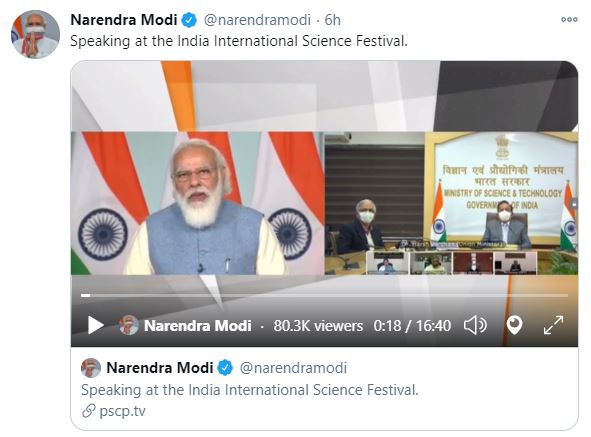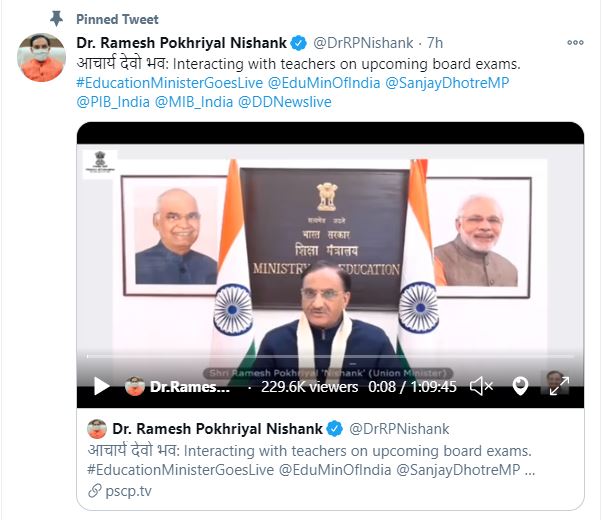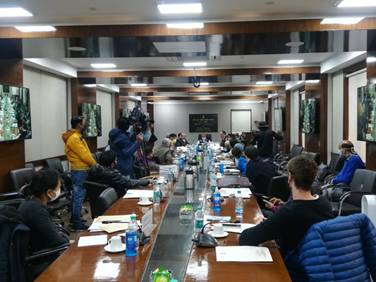Brooke India, EFF ink pact to prepare skilled equine Farrier workforce across the country

Solution World Bureau
Ghaziabad, Dec 22: An age old saying “No Foot, No Horse” tells us about the importance of health of horses’ feet. But over the years, especially after the use of equines decreased due to mechanisation, very little attention was paid to health of equid’s feet. Now, two leading international equine welfare organisations –Brooke India (BI) and Equine Farriery Foundation (EFF) – have joined hands to provide skilled and certified training for developing a professional multi-skilled Farriers workforce across the country.
Farriery is a craftsmanship used to fix horseshoes on the hoof of equines and properly shaping up the hooves. In India, Farriery is a hereditary craftsmanship, which is passed down generations, and there is a lack of formalised structured training programmes. The only formal Farriery training available in the country is in Indian Army/Para-military forces, which is not accessible to the Local Street Farriers (LSFs). As a result, these LSFs adopt faulty practices and demonstrate poor Farriery skills, thus resulting in hoof related issues and reduction in efficiency of the working equines.
In the past decade, BI through its programmatic intervention has identified that a majority of the working equines suffer from lameness, poor conformation, hoof imbalance, bad hoof shape, incorrect hoof angle, frog cutting and low hoof quality.The delivery of quality farrier services for working equine remains a big challenge for BI.
To transform the farrier trade and address the farriery related skill and resource gap issues in the country, BI has been exploring collaboration and resource sharing opportunities with Veterinary Universities/ Colleges and other like-minded organisations.
Towards this end, BI and EFF have signed a Memorandum of Understanding (MoU) cementing their commitment to address the equine centric issues and develop a professional multi-skilled Farriers workforce through formal training programmes.
As per the agreement, BI and EFF will work together to impart trainings at the EFF’s Equine Farriery Institute and at other places in the country, to identify, mentor and upskill LSFs, professionally develop BI’s Senior Vets, Global Farrier Trainers (GFT), Master Trainers Farriers (MTF), other selected Vets and EFF’s Farrier Trainers and Trainees.
BI will also support EFF in employing its trainees, who have completed the certified course. Besides, both organisations will also share resources, expertise and knowledge to support each other’s endeavours to improve Farriery Education and Training.
Furthermore, both organisations also plan to organise joint media campaigns and messaging on mutually decided issues related to the Farriery profession. The MoU further acknowledges that the partnership between BI and EFF will leverage support from their respective networks to make Farriery a recognised, respected and regulated profession in India.
Since its inception in 2001, Brooke India (BI) has been focussing on the upliftment of marginalised equine owning communities in 11 States and Union Territories in India which include Bihar, Delhi, Gujarat, Haryana, Himachal Pradesh, J&K, Maharashtra, Punjab, Rajasthan, Uttarakhand and Uttar Pradesh. Over the years, BI has been exploring opportunities to work with government bodies, veterinary universities and rural development agencies to propagate equine welfare issues and advocate for equine centric research and development. (https://www.thebrooke.org/our-work/india)
Equine Farriery Foundation (EFF) is a Non-Government company and is registered at the Registrar of Companies, Mumbai. EFF runs an Equine Farriery Institute at Dundlod (Rajasthan), which teaches farriery in India, which was established under the aegis of the Flying Anvil Foundation (FAF) Geneva, Switzerland as a joint venture with the Indigenous Horse Society of India (Jaipur) and the EFF. The EFF’s goal is to promote the professional competencies of Ferrari in India. To achieve its goals, it organises training courses for the farriers regularly, it initiates collaborations with local authorities, and seeks to open local training facilities- these become self-sustaining at a local level.
Modern science has a solution to many challenges faced by India, says PM Modi

Solution World Bureau
New Delhi, Dec 22: Prime Minister Narendra Modi’s inaugural address at the India International Science Festival (IISF) 2020 on Tuesday prominently mentioned about solutions. Modi said that modern science has a solution to the many challenges being faced by our country like water scarcity, pollution, soil quality and food security etc. Here, we want to apprise our readers that Solution World (solutionworld.news) is one of the premier websites of India that are engaged in Solution Journalism.
Modi said in his inaugural speech that India is now ready to create and adopt high-tech solutions to provide world class education, health, connectivity to the poorest people in every village. To achieve this world class education, health, connectivity and rural solutions, today’s India has data, demography and demand. Above all, India has democracy to balance and protect all this. That is why the world trusts India, the PM stressed.
He said that India has a rich legacy in science, technology and innovation. Our scientists have done path breaking research. Our tech industry is at the forefront of solving global problems. But, India wants to do more. We look at the past with pride but want an even better future, Modi said.
The Prime Minister said all our efforts are aimed at making India the most trustworthy centre for scientific learning. At the same time, we want our scientific community to share and grow with the best of global talent. One of the steps taken to achieve this is hosting and participating in hackathons to provide exposure and opportunity to Indian scientists.
Modi asserted that the New National Education Policy will help in fostering scientific temper from an early age. He said now focus has shifted from outlays to outcome, from textbooks to research and application. The Policy will encourage creation of a pool of top quality teachers. This approach will help the budding scientists. This is being supplemented by Atal Innovation Mission and Atal Tinkering labs, he said.
For Quality research, the Government is running Prime Minister Research Fellows Scheme to encourage the best talent of the country to undertake research as per the talent and interest. The Prime Minister informed that the scheme is helping scientists in the top institutes.
The PM emphasized the importance of making the benefits of science and technology to all. He said that Science and technology are bridging the gap of scarcity and impact. It is connecting the poorest of the poor with the government. With digital advances, India is becoming a centre of evolution and revolution of global high-tech power, he added.
Modi said reforms have now been undertaken in the Space Sector to encourage our youth and the private sector to not only touch the sky, but also the heights of the deep space. He said the new Production Linked Incentive Scheme also focuses on sectors related to science and technology. Such steps will give a boost to the scientific community, the ecosystem related to science and technology will get better and generate more resources for innovation and create a new culture of partnership between science and industry. He wished that this festival would give new dimensions to the Spirit of Coordination and Collaboration between Science and Industry as new collaborations will lead to new avenues.
The Prime Minister stressed that the biggest challenge facing science now, may be a vaccine for COVID pandemic. But the biggest long term challenge science faces is to attract high quality youngsters and retain them. He lamented at the attraction of youths towards technology and engineering domains and stressed on the need of developing science for development of the country. He further added what is called science today, becomes the technology of tomorrow and an engineering solution later. He said for attracting good talent into our science domain, the government has announced scholarships at various levels. But it needs a big out-reach from within the science community as well. He said the excitement surrounding Chandrayaan Mission was a great starting point to evince interest from youngsters.
Modi gave a call to the global community to invest in Indian talent and innovate in India. He told the gathering that India has the brightest minds, and celebrates a culture of openness and transparency. The Government of India stands ready to address any challenge and improve the research environment here. He said Science brings out the best within the person and uses the power of difference. He lauded our scientist for keeping India ahead and in a better position in the fight against Corona.
CBSE Board exams will not be held in Feb 2021, says Pokhriyal
Union Education Minister says CBSE will soon announce exact dates after discussion with all stakeholders

Solution World Bureau
New Delhi, Dec 22: Virtually interacting with teachers across the country, Union Education Minister Ramesh Pokhriyal ‘Nishank’ said on Tuesday that the CBSE Board examinations will not be held in February and exact dates will be announced soon.
On the question relating to Board Exam dates, Pokhriyal said that CBSE is making necessary preparations for conducting the 2021 examinations. As far as the final dates for the examinations are concerned, Board exams will not be held in the month of February and CBSE will very soon announce the dates after discussion with the stakeholders, he added.
Regarding a suggestion on providing vocational education in class IX, Pokhriyal said that there are approximately 8,583 CBSE schools that offer vocational education. He informed that that over 2,80,000 secondary schools, nearly 40,000 colleges and more than 1,000 universities are expected to provide vocational education with internship after the implementation of NEP 2020.
Responding on suggestion that teachers should be given sufficient training regarding the implementation of Competency Based Education in schools Pokhriyal informed that Ministry of education has implemented NISHTHA programme, which is an online capacity building programme for covering all 42,00,000 elementary school teachers and school heads of the country. This programme was conducted face to face before the pandemic. However, in its wake, this programme was contextualised to the needs of teaching and learning during the pandemic and made 100% online.
The Minister also informed that CBSE, KVS and JNV undertook a massive exercise to build online teaching capacities of their teachers as soon as the lockdown started, to ensure continuity of learning through online means, wherever possible. In the process, CBSE has trained 4,80,000 teachers, KVS trained 15855 and JNV trained 9085 teachers all India. Training was also imparted by NVS to teachers regarding online assessment, he added.
Pokhriyal further informed that teachers are being continuously trained for discovery based and experiential learning. The new National Curriculum Framework (NCF) for School Education has also been initiated and NCERT will be expected to make changes in the textbooks in accordance with the new NCF. Areas, such as creative thinking, life skills, Indian ethos, art, and integration, etc. need to be integrated.
In a question relating to students to be made aware of the ethical values and morals, the Minister said that the NEP, recommends, students should develop their ethical and moral reasoning, including knowledge and practice of human and “Constitutional values”; gender sensitivity; fundamental duties; citizenship skills and values; knowledge of India; environmental awareness including water and resource conservation, sanitation and hygiene; and current affairs and knowledge of critical issues facing local communities, states, the country, and the world. Following the ideals of NEP, the teachers can change the mindsets of the students and inculcate ethics & values among the students, he said.
Regarding schedule and syllabus of entrance examinations, the Minister said that the syllabus of JEE (Main) 2021 examination will remain the same as it was last year. However, in order to overcome the impact of reduction of syllabus undertaken by some Boards, the question papers for JEE (Main) 2021 will have 90 questions (30 question each in Physics, Chemistry & Mathematics), out of which the candidate will have to answer 75 questions (25 questions each in Physics, Chemistry & Mathematics), he added.
Modi govt’s desperate bid to get positive reportage over contentious Farm Acts in foreign media

Solution World Bureau
New Delhi, Dec 22: In an apparent and desperate bid to get positive reportage in foreign media in wake of ongoing farmers’ agitation against contentious Farm Acts, Union Agriculture Minister Narendra Singh Tomar held an interaction with members of the International media from the Foreign Correspondents’ Club of South Asia in New Delhi on Tuesday.
Speaking about the contentious Agriculture Acts, Tomar reiterated that “reforms” have been made in the interest of farmers and will bring about a new era in Indian agriculture. He said the Government has had many rounds of talks with farmer unions and is willing to continue the dialogue on contentious issues, clause by clause, with an open mind.
Prominent journalists from AlJazeera, Reuters, AFP, Kyodo_english, Business, Prensa Latina, Bloomberg, International News Services (UK), ARD German TV, PIO TV, UNI TV, The island Colombo, FCC President, Columnist, etc participated in the meeting.
Interacting with members of the International media Tomar said that the agriculture sector is the backbone of the Indian economy and the focus will be on doubling farmer’s income by 2022. He explained that the Farmers Produce Trade and Commerce (Promotion and Facilitation) Act 2020 and Farmers (Empowerment and Protection) Agreement on Price Assurance and Farm Services Act 2020 and the Essential Commodities Amendment Act 2020 are the biggest agricultural reforms in the country so far. The reforms will provide farmers market freedom, encourage entrepreneurship, access to technology and they will transform agriculture. He also said that India being a large democracy functions on the principle of “sabka saath, sabka vikas, sabka vishwas”.
During the interaction officials of the Agriculture Ministry explained in detail the provisions under the Farm Acts and how they will benefit the farmers and lead to the betterment of Indian agriculture in the new eco system. The Minister said that enacting the reform laws was not an overnight decision but it has gone through more than two decades of deliberations, suggested by numerous experts and recommendations by varied committees/groups. Regarding MSP the Minister said that MSP is an administrative decision and it will continue.
He said that the Modi Government has shown its commitment to MSP very clearly with multiple hikes and multi-fold increase in procurement, including in the 2020-21 Kharif season. Modi government announced MSP hikes based on the formula that farmers will get at least 1.5 times the cost of production. This was a promise made and delivered.
Tomar outlined the various measures and reforms undertaken by the Ministry of Agriculture and Farmers Welfare during the last six years. He said that Indian agriculture has come a long way from food scarcity to food surplus. The Government therefore had realised that pro farmers reforms were essential to uplift the sector i.e. the backbone of the economy. Every effort is being made to create an eco system of farmer friendly policies to see that the sector goes from strength to strength. The Pradhan Mantri Kisan Samman Nidhi (PM-KISAN) was introduced by the central government in February 2019 under which Rs. 6,000 per year is transferred to the beneficiary farmer’s account per year in three instalments. Since the inception of the scheme, a total amount of Rs. 95979 crore have been released so far and 10.59 crore farmer families have benefitted.
He said that a special drive has been undertaken to provide concessional credit to PM-KISAN beneficiaries through Kisan credit card. He said that Neem Coated Urea was introduced since 2015-16 for reduced use of chemicals, improved soil health, overall increase in crop yields and reduction in the use of urea for non-agricultural purposes. Agriculture Infrastructure Fund (AIF) was launched on August 9, 2020. The aim of the fund is to provide medium to long term debt financing for investment in viable projects for post-harvest management. Tomar also spoke about the Farmer Producer Organisations (FPOs). Scheme for Formation and Promotion of 10,000 FPOs with a total budgetary provision of Rs. 6865 crore has been launched on February 29, 2020. Under the scheme, formation of 10,000 FPOs across the country is targeted in five years.